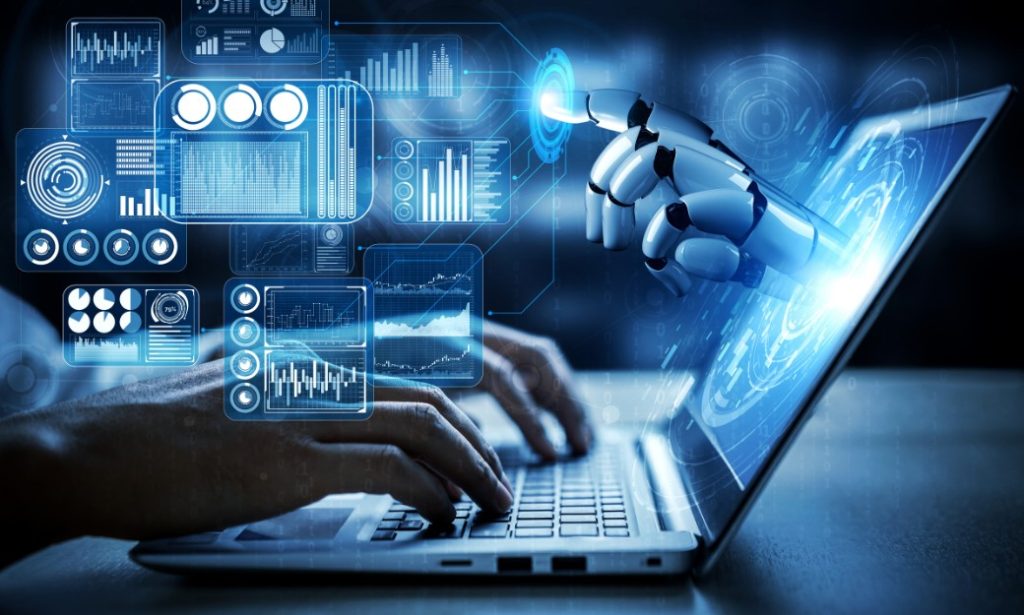Artificial intelligence (AI) is transforming how businesses operate, leading to unprecedented innovation and efficiency. How AI is reshaping business spans across various industries, improving productivity, customer engagement, and decision-making. AI’s integration into daily operations has become a strategic imperative, with businesses adapting to its capabilities to stay competitive and future-proof.
Enhancing Operational Efficiency
One example of how AI is reshaping business is that AI-driven automation has redefined operational workflows. This allows businesses to optimize processes and reduce operational costs. For instance, in supply chain management, AI systems can predict demand and manage inventory more accurately, leading to lower costs and better customer satisfaction. Companies like Amazon and Walmart utilize AI to automate and streamline logistics, minimizing delays and waste.
In addition to supply chains, customer service has seen remarkable transformations through AI. Virtual assistants and chatbots can now handle a significant portion of customer interactions, providing 24/7 support. These AI tools are not just programmed to respond; they learn and adapt, improving the customer experience over time. Chatbots powered by natural language processing (NLP) are already making customer service more efficient by reducing response times and increasing satisfaction.
Revolutionizing Decision-Making
Businesses are increasingly relying on AI to make informed decisions. Data-driven insights generated by AI systems help managers understand market trends, customer behavior, and internal processes. This predictive capability allows companies to stay ahead of the competition. For example, AI algorithms can analyze vast amounts of consumer data to identify purchasing patterns, enabling businesses to tailor their marketing strategies accordingly.
Moreover, AI in predictive analytics helps businesses foresee potential disruptions or opportunities, allowing for more proactive decision-making. Retail companies, for example, use AI to predict which products will sell during specific seasons, improving inventory management.
Personalizing the Customer Experience
One of the most visible impacts of AI is its ability to personalize the customer experience. Retailers and service providers use AI to analyze customer preferences and behaviors, offering personalized recommendations that enhance user engagement and sales. AI can tailor content, advertisements, and product suggestions to each customer’s preferences, which increases conversion rates and builds customer loyalty.
Companies like Netflix and Amazon have perfected the art of AI-driven recommendations. By analyzing data on viewing or purchasing habits, AI suggests content or products that customers are more likely to enjoy, improving satisfaction and encouraging repeat business.
AI and Business Security
Cybersecurity is another critical area where AI is making a significant impact. With the increasing prevalence of cyberattacks, businesses are turning to AI-driven systems for real-time threat detection and response. AI can analyze patterns in network traffic and user behavior to identify anomalies, making it easier to detect and prevent potential security breaches before they escalate.
For example, AI tools are being used to prevent fraud in the financial sector by monitoring transactions in real time and flagging suspicious activity. As cyber threats become more sophisticated, businesses will continue to rely on AI to protect their data and systems.
AI’s Role in Innovation and Product Development
AI is also playing a pivotal role in innovation, driving research and development (R&D) in various sectors. In healthcare, AI is helping develop new treatments by analyzing medical data and identifying patterns that human researchers might miss. Similarly, in manufacturing, AI systems are revolutionizing product design and production processes, leading to smarter, more efficient manufacturing systems.
The rise of AI in R&D has led to innovations such as autonomous vehicles, personalized medicine, and sustainable manufacturing practices. In industries such as automotive and pharmaceuticals, AI is being leveraged to speed up the development process, reduce errors, and bring products to market faster.
Overcoming Challenges
The advantages of AI are significant, but businesses face challenges like ethical concerns, data privacy, and workforce displacement. Many organizations are addressing AI biases and ensuring compliance with necessary data protection regulations for AI applications. Additionally, as automation increases, companies are faced with the task of upskilling employees to work alongside AI systems.
The key to overcoming these challenges lies in responsible AI adoption. Organizations must implement robust governance frameworks to ensure transparency and accountability in AI decision-making. Moreover, continuous investment in employee training is necessary to help the workforce transition into more AI-centric roles.
As we move further into the digital age, it’s clear that how AI is reshaping business is more than just a trend—it’s a fundamental shift in how companies operate. From enhancing operational efficiency and decision-making to personalizing customer experiences and securing businesses, AI’s influence is far-reaching. Businesses that embrace AI’s transformative power will not only improve their performance but also position themselves for long-term success. To fully harness AI’s potential, companies must navigate its challenges thoughtfully and strategically, ensuring that both technology and humanity advance hand in hand.


